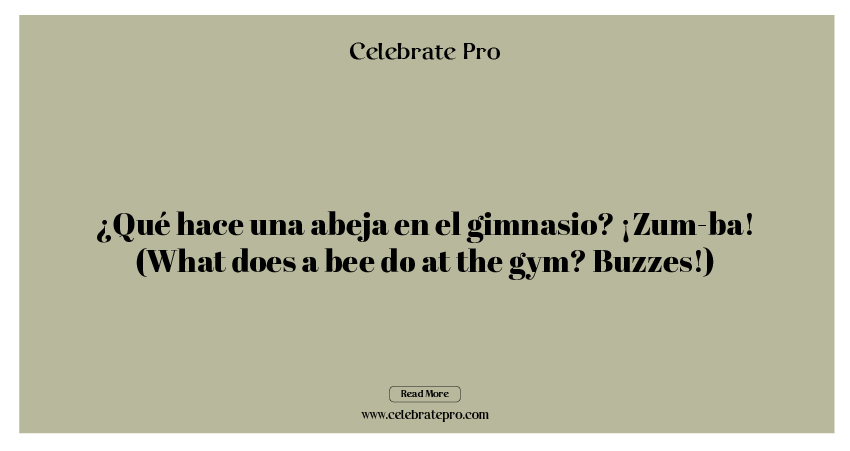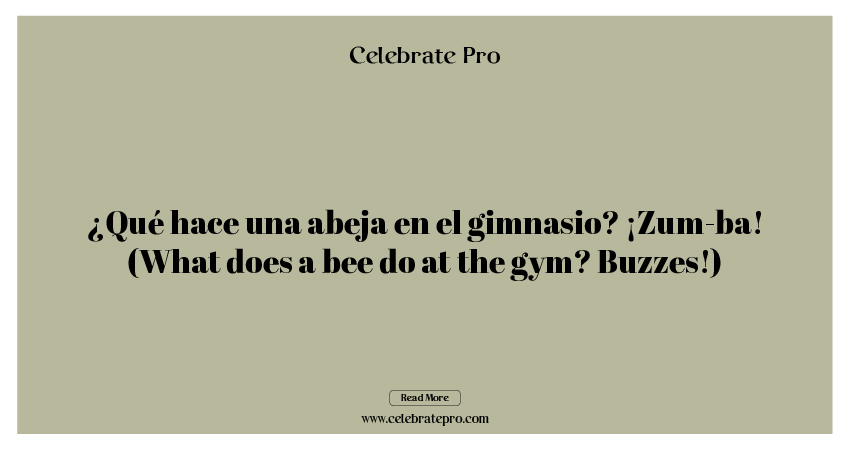Are you ready to dive into the world of Spanish puns? Get ready for a wild ride filled with laughter and linguistic cleverness. In this article, we’ll delve into the amusing realm of Spanish puns, exploring their different forms and detailing some of the best examples across various categories. Whether you’re a language enthusiast, a comedy lover, or simply looking for a good laugh, Spanish puns have something for everyone.
What are Spanish Puns?
Spanish puns, commonly referred to as “juegos de palabras” in Spanish, are wordplay that exploit the multiple meanings or similar sounds of words to create humorous or witty effects. They play with the richness of the Spanish language, its idioms, double entendres, and homophones. Spanish puns can bring laughter and joy to everyday conversations, making language learning a truly enjoyable experience.
Best Short Spanish Puns
- ¿Qué dijo el número 1 al número 10? “Para ser como yo, debes ser sincero.”
- ¿Cómo se llama el campeón de buceo japonés? Tokofondo.
- Si el mundo es un pañuelo, España es la mocosidad.
- ¿Cuál es la marca de agua preferida de los pájaros? “Nestlé”.
- ¿Qué le dijo el semáforo al coche? “No me mires, me estoy cambiando.”
- ¿Qué hace una abeja en el gimnasio? ¡¡Zum-ba!!
- Adivínalo: ¿cuál es el pez menos pesado? ¡El pez-ado!
- ¿Qué hace una abeja en Facebook? “Zum-ganché”.
- ¿Qué le dice una gamba a otra? “Quiero gambarte”.
- ¿Qué hace un abogado en el mar? “Nada, porque se le mojan los expedientes”.
- ¿Cómo se llama el campeón de lanzamiento de disco? “Platúm”.
- ¿Por qué los elefantes no usan Facebook? Porque ya tienen bastante con el “elelog”.
- ¿Cuál es la ciudad más feliz? “Alegría”.
- ¿Cuál es el animal más seguro de sí mismo? El “segurillo”.
- ¿Cuál es la comida que al entrar alabas, y al salir, regañas? El “elogión”.
- ¿Cuál es el animal más antiguo de la historia? La “distor-tuga”.
- ¿Cuál es la comida más rockera? “La salsicha”.
- ¿Con cuántas abejas se hace una guerra? “Con abejas y media”.
- ¿Qué hacen dos abejas en el baño? “Es-ter-menes”.
- ¿Cuál es el santo más perro? “San-bernardo”.
- ¿Cuál es el día más fuerte? “Miér-coles”.
- ¿Qué hace un perro afónico cuando quiere entrar a casa? “¡Guau-kersfield!”
- ¿Cuál es el vino más popular entre los países? “El vinagre”.
- ¿Cuál es la verdura más saltarina? La “poleabilis”.
- ¿Qué le dijo el siete al ocho? “Me a-traes”.

One-Liner Spanish Puns
- Estoy pensando en crear una banda llamada “La Tripleta”. ¿Cómo suena eso?
- No llevo alpiste en el bolsillo, pero sí una tarjeta de crédito por si se me antoja alguna semilla.
- ¿Qué hacen las abejas en la peluquería? ¡Enjambrarse!
- ¿Qué hace una abeja cuando quiere ir al baño? Busca el zum-baño.
- Calculé la distancia hasta la panadería y sí, ¡es lo suficientemente larga como para tomar el carro!
- Tengo pensado comprar una granja y criar cerdos. ¿Su nombre? Pigcasso: cerdo-artista.
- ¿Por qué las abejas no usan el e-mail? Porque les dan miedo las picaduras electrónicas.
- ¿Cómo se dice “espárragos” en japonés? ¡ “Saiko!” (Soy ciego).
- ¿Cuál es el instrumento favorito de los pájaros? El “pia-no”.
- ¿Por qué los pájaros no usan computadoras? Porque ya tienen “twit-ter”.
- ¿Qué le dijo la guitarra al músico? “Tócame”.
- ¿Por qué las mariposas no van a la escuela? Porque ya saben leer “bien”.
- ¿Cuál es el animal más limpio? El “cerdito”, porque siempre dice “Soy un cerdito limpio”.
- ¿Cuál es el ave que siempre llega a tiempo? ¡El “puntual-lo”!
- ¿Por qué nadie quería jugar ajedrez con el dragón? Porque siempre hacía “jaque-mate”.
- ¿Cuál es el país que más veces se ha fracturado? “Españia”.
- ¿Qué les dice un seminarista a las hormigas? ¡”Hormiguitas, en un dia-go-no-sis”!
- ¿Cómo se llama el campeón de running en el mar? “Jacinto Delmar”.
- ¿Cuál es la fruta más aventurera? “La abentoja”.
- ¿Cuál es la comida favorita de los vampiros? “Las mordi-hamburguesas”.
- ¿Qué hacen los peces cuando tocan una campana? “Se sacuden las es-ca-mpanas”.
- ¿Cuál es la parte del cuerpo más divertida? “La bachata”.
- ¿Qué hace un pato experto en artes marciales en el ring? “Patada a-cuá-tica”.
- ¿Por qué las abejas nunca llegan tarde? Porque siempre van volando.
- ¿Qué le dijo una uva verde a una uva morada? “Respira, respira… ¡Uvama!”
Funny Puns for Spanish
- ¿Cuál es la comida más valiente? “El higo de Morante”.
- ¿Cuál es la fruta más arrogante? El “mandarín”.
- ¿Qué le dice un semáforo a otro? “No me mires, me estoy cambiando”.
- ¿Cómo se llama la ave más promiscua? La “paloma-mía”.
- ¿Cuál es la bebida que más pide perdón? ¡El agua por “aguardiente”!
- ¿Qué le dice un espagueti a otro? ¡¡Mañana te llamo y te “envuelvo”!!
- ¿Por qué las abejas nunca se olvidan de nada? Porque siempre toman “apineas”.
- ¿Cuál es la pizza que no es ausente? La “compe-“dejada”.
- ¿Qué le dijo un semáforo a otro? “No me mires, me estoy cambiando”.
- ¿Cuál es el lugar más asustadizo? “Äfrica” (a “grito a”).
- ¿Qué hizo el mar en el cine? “Ver la pe-li-mar”.
- ¿Cuál es la verdura más peleona? “El pepino” (pe-pino).
- ¿Qué hace Juan sin miedo cuando tiene miedo? ¡¡Juan con miedo!!
- ¿Qué le dice una papa Lolita a otra papa? “Papa mí”.
- La cigüeña lleva “bebés”, pero el bebé lleva pañales.
- ¿Cuál es la fruta más aplicada? “El manzana-droid”.
- ¿Qué le dijo una hamburguesa a otra? “Nos vemos entre panes”.
- ¿Cuál es el pez más cansado? El “esca-marajo”.
- ¿Qué hace una abeja para hacer ejercicio? ¡¡Zum-ba!!
- ¿Cuál es la ciudad más vaga? “Perezosa”.
- ¿Qué le dice un tren a otro? “No me mires, me estoy des-train-do”.
- ¿Cuál es el país favorito de los electrónicos? ¡”Chip-re”!
- ¿Qué hace una abeja en el gimnasio? “¡¡Zum-ba!!”
- ¿Cómo se llama el campeón de lanzamiento de disco? “Platúm”.

Spanish Puns for Kids
- ¿Cuál es el pez más músico? “El atún”.
- ¿Qué le dice una uva verde a una uva morada? “Respira, respira… ¡uvama!”.
- ¿Cómo se dice “ojo” en chino? “Chin-tu-ojo”.
- ¿Qué hace un árbol en el gimnasio? ¡”En-tra-na”!
- ¿Cuál es el animal más antiguo? “La dis-toruga”.
- ¿Qué hace un abogado en el mar? “Nada, porque se le mojan los expedientes”.
- ¿Cuál es el lugar más aburrido? “¡Espera-no!”.
- ¿Qué le dijo el semáforo al coche? “No me mires, estoy cambiando de luces”.
- ¿Qué hacen dos abejas en el baño? “Es-ter-menes”.
- ¿Cuál es el león más rápido? “El veloz”.
- ¿Por qué las abejas nunca llegan tarde? Porque siempre van “volan-do”.
- ¿Qué le dice una planta a otra? “Nos vemos en la raíz”.
- ¿Cuál es el animal más ordenado? “La abeja” (a be ja).
- ¿Qué le dijo el número 8 al número 10? “Contigo siempre somos mayores”.
- ¿Cuál es el animal más adelantado en tecnología? ¡El “Ratón”!
- ¿Qué dice la silla al que llega tarde? “¡Siéntate y espero!”
- ¿Cuál es la fruta que siempre pierde? “La fruta perdida”.
- ¿Qué hace una abeja en el gimnasio? ¡”Zum-ba”!
- ¿Qué le dice el semáforo al coche? “No me mires, estoy cambiando de luces”.
- ¿Cuál es el animal más trabajador? “La hormiga laboriosa”.
- ¿Qué hace un espagueti en el gimnasio? ¡”Zum-ba”!
- ¿Cuál es el número favorito de las abejas? ¡El “zum-tres”!
- ¿Qué le dijo el sol al mar? “Eres la ola de mi vida”.
- ¿Cuál es el pájaro más vestido? ¡El “pa-lomo”!
- ¿Qué le dijo un plátano a una gelatina? “¡Eres muy fruta!”.
Catchy Spanish Puns Used in Movies
Spanish puns have also made their way into the world of movies, adding a touch of humor to memorable dialogues. Some famous examples include:
- “No vivas la vida, carpe Diem” – from the movie “Dead Poets Society”. This pun plays on the Latin phrase “carpe Diem” (seize the day) by changing “Diem” to “Diem” sound-alike “Deem” (as in “don’t live life”).
- “Me llamo Íñigo Montoya, tú mataste a mi padre, prepárate a morir” – from the movie “The Princess Bride”. This pun relies on the name “Íñigo Montoya” and the repetition of “padre” and “preparar” to create a humorous, memorable line.
- “Hasta la vista, baby” – from the movie “Terminator 2: Judgment Day”. This iconic line uses the Spanish phrase “Hasta la vista” (meaning “See you later”) and adds a playful twist with the addition of the English word “baby”.
- “¡No hay problema!” – from the movie “The Lion King”. This line, spoken by the meerkat Timon, uses a common Spanish phrase meaning “No problem” to add a lighthearted touch to the dialogue.
These examples demonstrate how Spanish puns can elevate the comedy level in movies, making them more entertaining and enjoyable for audiences.
Key Takeaways
Spanish puns are a delightful way to add humor and wit to everyday conversations and creative works. From short puns to one-liners, these linguistic twists revel in the richness of the Spanish language, showcasing its idiosyncrasies and double meanings. Whether you’re a language lover, a comedic enthusiast, or simply looking to inject some laughter into your day, exploring the world of Spanish puns is a fun and rewarding







